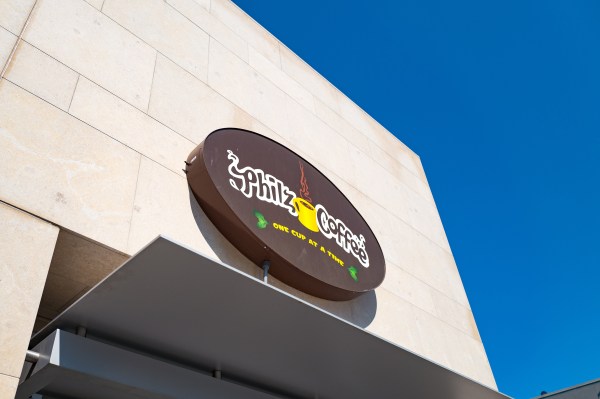Welcome to this week’s transcribed edition of This is Your Life in Silicon Valley. We’re running an experiment for Extra Crunch members that puts This is Your Life in Silicon Valley in words – so you can read from wherever you are.
This is your Life in Silicon Valley was originally started by Sunil Rajaraman and Jascha Kaykas-Wolff in 2018. Rajaraman is a serial entrepreneur and writer (Co-Founded Scripted.com, and is currently an EIR at Foundation Capital), Kaykas-Wolff is the current CMO at Mozilla and ran marketing at BitTorrent. Rajaraman and Kaykas-Wolff started the podcast after a series of blog posts that Sunil wrote for The Bold Italic went viral. The goal of the podcast is to cover issues at the intersection of technology and culture – sharing a different perspective of life in the Bay Area. Their guests include entrepreneurs like Sam Lessin, journalists like Kara Swisher and politicians like Mayor Libby Schaaf and local business owners like David White of Flour + Water.
This week’s edition of This is Your Life in Silicon Valley features Jacob Jaber, the CEO of Philz Coffee. During this episode, we try to convince TechCrunch’s Kate Clark why Philz Coffee is a better option than Starbucks. Jacob also talks about the tech community, his business goals, and whether he’d ever consider leaving San Francisco.
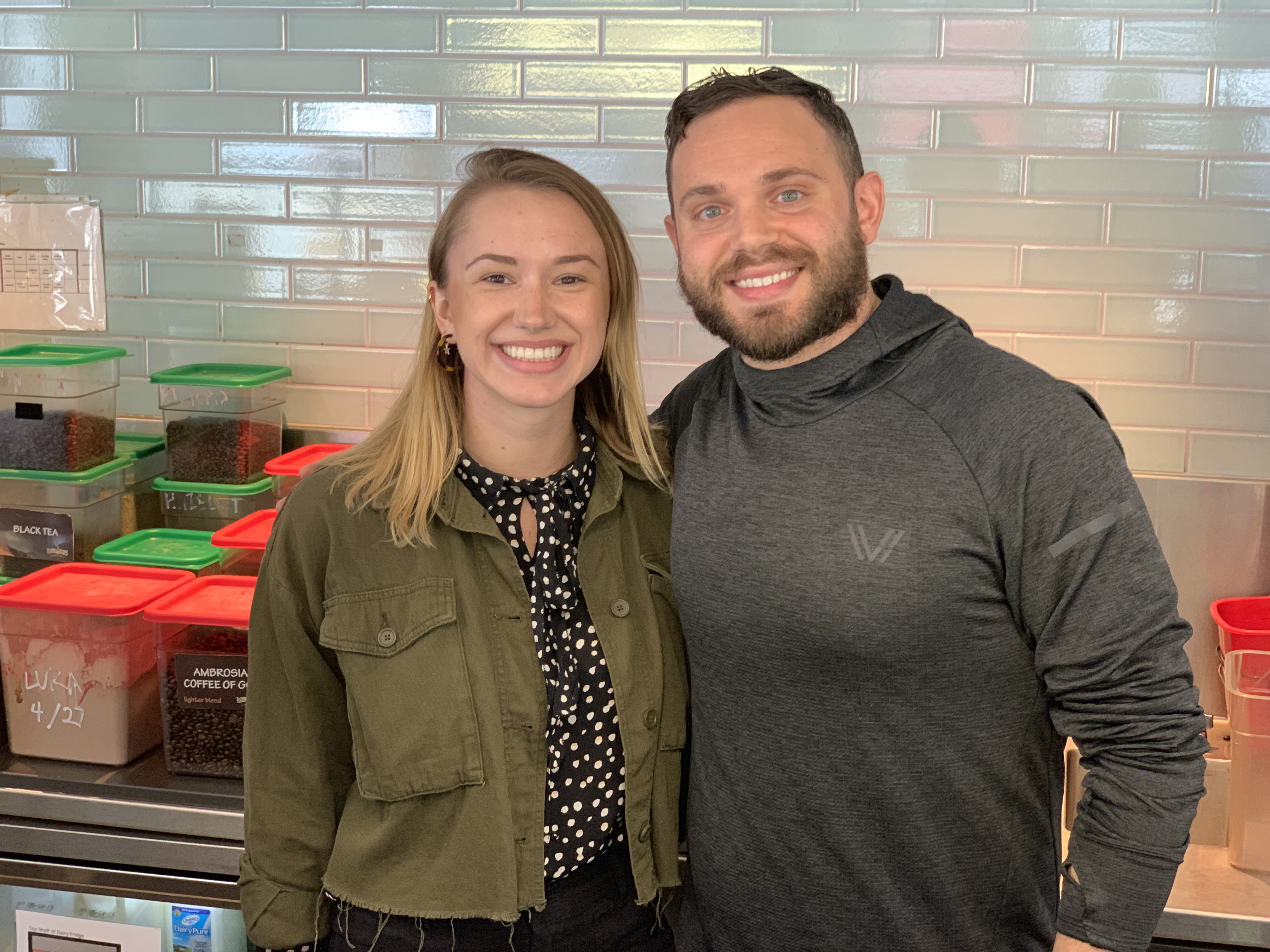
You don’t want to miss this week’s edition of TIYLISV, which is extremely lively and may change your coffee-drinking habits.
For access to the full transcription, become a member of Extra Crunch. Learn more and try it for free.
Sunil Rajaraman: Welcome to season three of “This is Your Life in Silicon Valley” a podcast about the Bay Area, technology, and culture. I’m your host, Sunil Rajaraman, and I’m joined by my cohost, Jascha Kaykas-Wolff.
Jascha Kaykas-Wolff: I always wonder if things that happen on Twitter are actually real or not. Like is it just all made up stuff, or do people actually interact with each other and then see each other in the real world.
Sunil Rajaraman: You know, I wonder that too, until today.
Jascha Kaykas-Wolff: Just today?
Sunil Rajaraman: No, not really. I’ve actually met some great people on Twitter.
Jascha Kaykas-Wolff: Well today was a pretty special day because we have two guests. Two guests that came from Twitter.
Sunil Rajaraman: So I follow Kate Clark who’s a reporter for TechCrunch, and I noticed she sent something out that effectively said that she hates Philz more than Starbucks. And I’m a huge Philz apologist.
Jascha Kaykas-Wolff: Well, you’re not just a Philz apologist, you’re just kind of a fan.
Sunil Rajaraman: I’m a fan. So my instinct was to actually tag Philz Coffee’s official account and the CEO of Philz in that Twitter thread.
Jascha Kaykas-Wolff: Yeah, and a little bit of magic ensued.
Sunil Rajaraman: A huge tweet thread followed and Jacob actually responded and that’s what brings us here today for this week’s special edition of “This is your Life”.
Jascha Kaykas-Wolff: Yeah, so this is a special episode, it actually started a bit before we were recording, where we met Jacob and Kate at a local Philz close to our recording studio, and Jacob went off the menu and made us a bunch of drinks before we showed up here to do the recording.
Sunil Rajaraman: What it essentially was is a CEO of a pretty big company doing a customer service call, and reporting it on today’s episode of the podcast.
Jascha Kaykas-Wolff: It’s pretty cool. It’s a great conversation, a wide range of discussions, and I think you’re really going to enjoy it. We certainly did.
Sunil Rajaraman: Enjoy today’s episode of “This is Your Life in Silicon Valley” featuring Philz CEO Jacob Jaber, and TechCrunch’s Kate Clark.
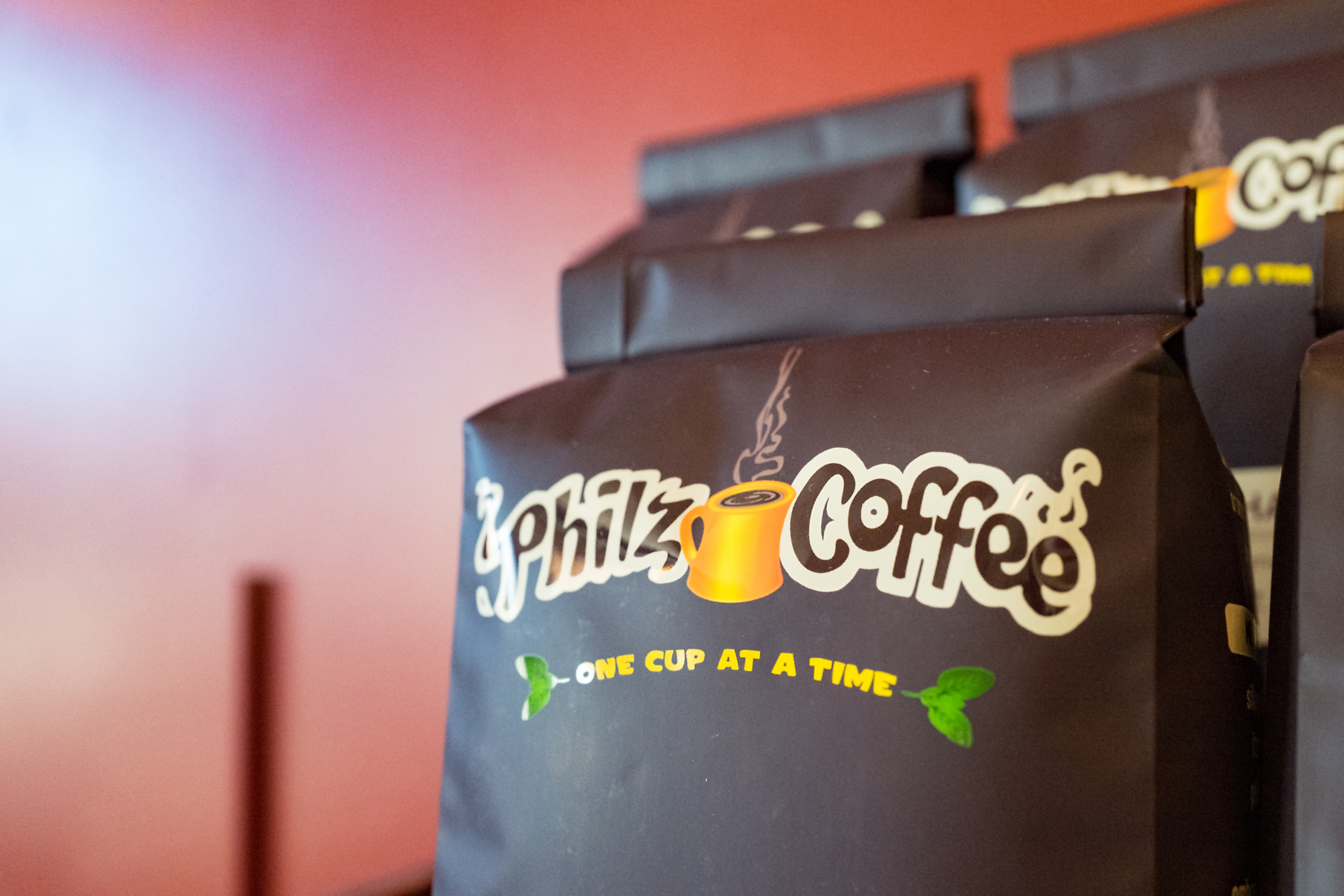
Photo by Smith Collection/Gado/Getty Images
Jacob Jaber: Mom used to make for us after a meal, to kind of complete a meal, settle our stomachs and extend the conversation around the table so that one’s a really special drink for us and it’s going really well. We made the oatmeal cookie, which is an off-menu drink, which is a combination of the Julie’s ultimate darker blend and a little bit of hazelnut beans, with some cinnamon, and then we made the mint mojito for Kate.
Sunil Rajaraman: Kate, I have a couple of questions, and I’m just going to lead in.
Kate Clark: Yup, go ahead.
Sunil Rajaraman: Was everything you had today better than a Starbucks vanilla latte?
Kate Clark: Yes, I did like what I had today more than my go-to drink at Starbucks, which is an iced vanilla latte. But, I want to tell our, the listeners what I told you guys which is, it’s not that I love Starbucks coffee, it’s just that I’m from Seattle and I was still feeling like I’m used to the brand, and the environment, and I like that you can walk into a Starbucks and you’re in and out in a few minutes.
I don’t like that when you go to Philz, you’re kind of stuck in a strange experience where you’re not exactly sure where to go, you can’t order an espresso drink and that’s kind of why I had this feeling of, I hate Philz more than I hate Starbucks, but yes, the coffee I had today was really good. I’m still a little skeptical about the rose coffee, but I like the backstory.
Sunil Rajaraman: Was the experience today good?
Kate Clark: Well the experience today was a little unique considering the CEO of Philz was making our drinks for us. So yes, the experience today was great, but I didn’t have to walk up to the line, I still don’t know exactly where you go to order, but I didn’t.
Jacob Jaber: Start with the barista.
Kate Clark: Start, but which end is the barista?
Sunil Rajaraman: Jacob, explain the experience and clarify it to our listeners.
Jacob Jaber: Sure, so when my dad and I started, we thought about people. We thought about coffee, we thought about experience, and payment was never something we focused on deeply. We thought about, how can we craft the perfect experience, the perfect cup, for each individual customer. We thought it was really important to order from the barista that’s going to make you your drink, and then pick up from that barista, and for them to make sure you’re happy with it. So that’s why at Philz, you start with the barista, while they start freshly brewing it, you go on and grab some food if you like, pay, and then they’ll call you back up to pick it up.
Jascha Kaykas-Wolff: Are you a better barista than most of your baristas?
Jacob Jaber: You know what, it’s a competition right now. We have so many fantastic people, but every quarter we do something called “Back to Roots” where everybody in the home office and the roasting facility, we all go to a store and do a shift so you can have some empathy and you can practice your barista skills, and everybody also has to be coffee trained even if they’re not working at the store.
Jascha Kaykas-Wolff: When you heard that story, Kate as we’re talking about it, did you think differently about Philz after that? We were talking about, before we started recording, you being from Seattle, growing up in Seattle, and the experience around coffee, and ordering coffee in particular, is pretty unique there.
Kate Clark: Yeah, and I mean in Seattle, everyone knows where the first Starbucks store is. Everyone knows the backstory of Howard Schultz, everyone is familiar with the brand. Coming, moving to San Francisco last summer, I saw Philz, but I had no idea about anything, about the backstory. So yes, it definitely changes how I feel about the company and changes how I feel about specific drinks knowing how there was so much thought put into it, and it will probably encourage me to visit Philz more in the future.
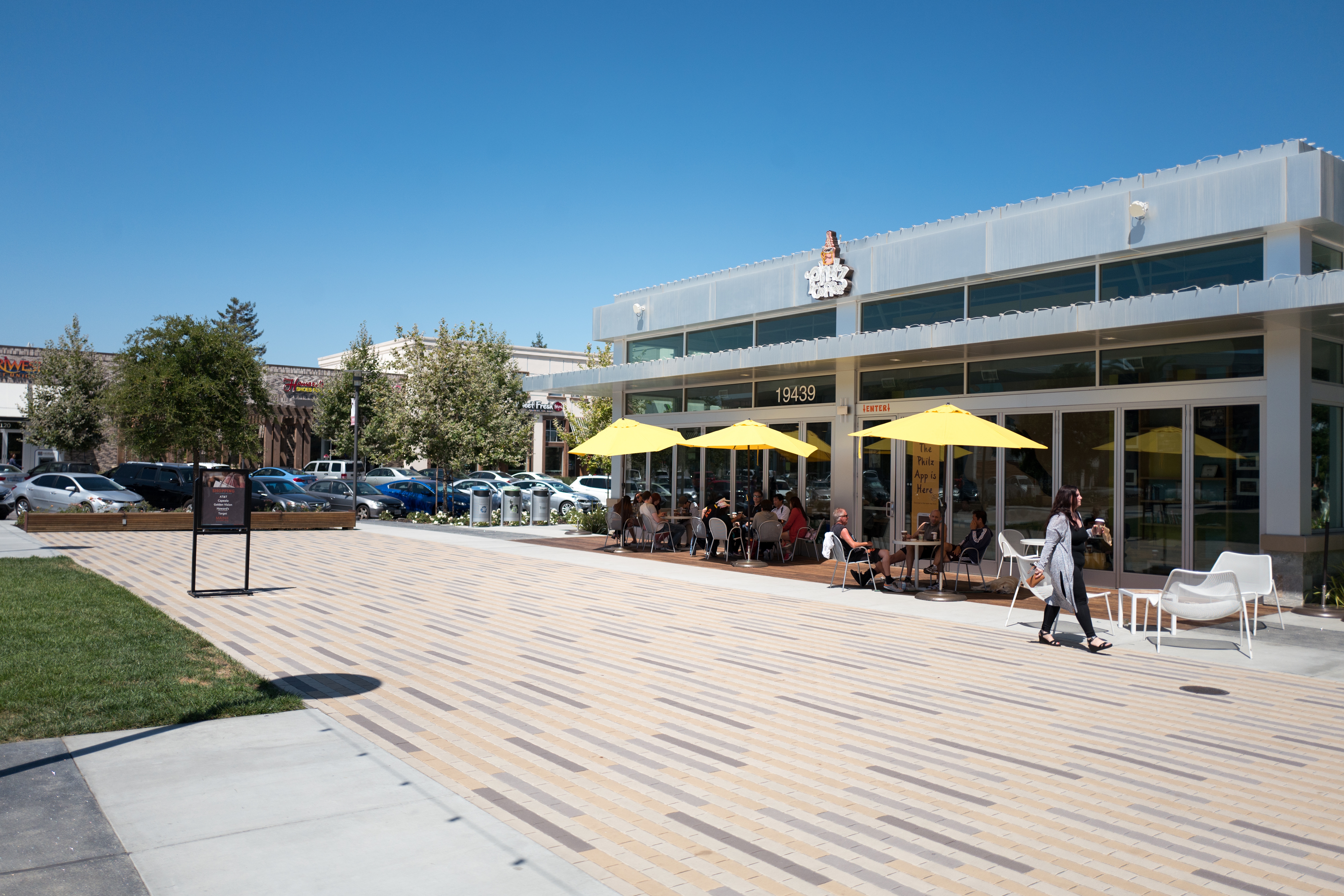
Photo by Smith Collection/Gado/Getty Images
Sunil Rajaraman: So, just..
Jacob Jaber: Well there are over four million ways to enjoy your cup, there is something for everyone. If you’re a coffee purist and you love a great quality black cup of coffee, we have something great for you, and if you like something a little sweeter, we have something great.
Jascha Kaykas-Wolff: There’s four million? Four million? Is that real?
Jacob Jaber: There are over four million ways to enjoy your Philz.
Kate Clark: That math seems…
Jacob Jaber: There are fifteen blends, there is a multitude of ingredients we could incorporate. We have cardamom spice, which we include in the Turkish and the Philharmonic, we also have cinnamon, we have nutmeg and clove, which we make with our chai, and when you combine all of these things, and you mix and match and you have half of one blend, or half of the other, it adds up pretty quickly. So yeah, we’ve actually calculated that. I think it’s 4.5, maybe a little more now since we’ve added —
Sunil Rajaraman: So disclosure to today’s listeners, no one on this show has any affiliation with Philz, as a shareholder, as an investor, or anything, and we’re not doing advertorial content for Philz. I just want to point that out.
Kate Clark: Well what we did learn though actually, when we were drinking our coffee, is that Michael Arrington, the TechCrunch founder, is an investor in Philz.
Sunil Rajaraman: Okay, so there is a conflict, of course, there’s a conflict. Okay, okay. Well,
Jascha Kaykas-Wolff: It’s just loose affiliations.
Jascha Kaykas-Wolff: FCC, FCC regulations though that we have to follow for a podcast do we?
Sunil Rajaraman: No, I don’t think so, but there is no ethics breach here. So let’s veer off topic here for a second because I want to finish up with Kate’s tweet. We’ll really, I just want to go back to that. But, Kate, where are you from, how did you get here, and tell us about your journey to the valley.
Kate Clark: Yeah, so as I mentioned, I’m from Seattle, I grew up there. I moved to San Francisco about nine months ago, so I’m still very fresh. I moved here for a job at TechCrunch. I’m a journalist covering tech startups, and this is just where all the tech, all of the startups are.
Sunil Rajaraman: When you grew up in Seattle, was there a point in time where you were like, I have to move to San Francisco, I want to move to San Francisco, San Francisco is going to be my city.
Kate Clark: Definitely not. Seattle is known, of course, for Amazon and Microsoft, and it does have a really huge tech ecosystem and a community of tech workers, but growing up there was not something I was close with, or thought about, and I wanted to be a newspaper reporter, like, boots on the ground, didn’t think about covering tech in the slightest. So I never thought about moving here. It wasn’t until about maybe a year or so before I did that I was like, that probably makes sense to go there considering what I now cover.
Sunil Rajaraman: Jacob, tell us about you, where you’re from, how much time you spent in San Francisco. It sounds like you’re a native?
Jacob Jaber: Yeah, I was born and raised, I was born actually in South San Francisco, not too far from here, and the original Philz used to be a grocery store in the mission, on 24th and Folsom, so growing up when I reached ten years old I started helping my dad after school at the grocery store. So I spent a lot of time in the mission, so I’m proud to be a native here.
Sunil Rajaraman: Did either of you get in a lot of trouble as kids. Like so in high school, what was the worst thing that you got, I don’t know, punished for, or faced a ramification for.
Jacob Jaber: I was playing basketball one day in high school on the courts during lunch time and we were, I was a little bit rough with one of the kids and he was a little rough with me, and before you knew it we started swinging at each other and then it got, I got suspended, but then a couple weeks later we because friends and apologized to one another. That was like the worst that happened.
Jascha Kaykas-Wolff: That feels pretty tame. So you’re kind of a goody two shoes through and through that’s what you’re saying?
Jacob Jaber: You know, growing up I was so focused on Diablo and StarCraft, playing those games, so I would spend a whole ton of time nerding out, playing those games, strategizing, and that actually was a great lesson for me in business, those two games specifically, because they require planning, strategic thinking, so I was hooked on that until I got a little bit chubby and then I got on a diet and started obsessing with working out, and then that was my next focus.

Image via Getty Images / ChrisBoswell
Sunil Rajaraman: We’re going to come to you in a second Kate so hopefully you’re thinking about the thing that you did that got you in the most trouble as a kid. Jacob, was there a point in the where you were like, I have to explore outside of San Francisco?
Jacob Jaber: No, not really. I think that I have family in different places so I spent a lot of time in Los Angeles, but I think the city is wonderful and it’s really beautiful so I’m definitely not tired of it. I love traveling and seeing different places and now that there’s Philz in other places I get the chance to visit explore other cities, but I do love this city.
Sunil Rajaraman: Kate, what did you do as a kid that got you in so much trouble that you’re embarrassed to tell anybody except for our listeners.
Kate Clark: Well, I had a pretty untraditional childhood in that my parents traveled a lot for work and when they were around they didn’t have any rules, so I never got in trouble because they didn’t care what I did. So I never have, I have no stories of my parents punishing me for any kind of bad behavior because they were just like, you can leave the house whenever you want, you can do whatever you want, it was very relaxed.
Jascha Kaykas-Wolff: I had a big party once where it got busted by fifteen squad cars. There’s not a lot to do
Kate Clark: Wow.
Jascha Kaykas-Wolff: It wasn’t that kind of crazy party, and one of my friends who was like the star of the team and the state ended up climbing a tree to hide from the cops. So that was my story, how about you Sunil?
Sunil Rajaraman: Actually I haven’t even gotten a parking ticket.
Kate Clark: What?
Jascha Kaykas-Wolff: I mean, you grew up in Cleveland, you had to have done bad stuff.
Sunil Rajaraman: Uh, I didn’t grow up in Cleveland, as we talk about every single episode. But I see after a year of doing this, we’re still going over this. I was born in Saratoga, I went to High School in Cleveland.
Jascha Kaykas-Wolff: It’s kind of the same thing.
Sunil Rajaraman: I’m sure if I thought back, maybe there were things that I have.
Jascha Kaykas-Wolff: Nothing, thanks for having everybody else share, but you keeping close to the–
Sunil Rajaraman: That’s the key to good interviewing!
Kate Clark: Yeah, definitely.
Sunil Rajaraman: So let’s talk about the tech community for a second, I’m curious to hear both of your takes. You have very, very different angles into this. You cover tech all day, Kate, and Jacob, you serve probably large portions of the tech community. What is something that the tech community is doing really well, and what’s something that the tech community is doing that they really need to vastly improve on quickly?
Kate Clark: Doing well? What are the tech communities doing well… I mean, I think everybody is trying really hard to, are we talking like, what are they doing well in San Francisco specifically, or are we talking?
Sunil Rajaraman: Let’s take it as a San Francisco-specific, Silicon Valley-specific question.
Kate Clark: I feel like it’s hard for me to compliment the tech community, I feel like my thoughts are a little more critical, because I just tried really hard and I can’t think of anything. What are they not doing well? I think people are way too focused on tech I think. There are not enough outlets for having lives outside of their jobs, having discussions that don’t revolve around tech, having discussions that aren’t about IPOs, aren’t about Uber, it just seems like everywhere you go within the city you can’t escape those conversations. I think I would say just taking a step back and getting outside of the bubble is really what they need to be focusing on.
Jacob Jaber: Yeah I think I love the ambition and the entrepreneurial spirit here, but I also think that it has to start with people and it has to start with a balance in rich life, and I think that often times there’s this thing around working hard and spending all your time and working countless hours to build a company and be successful and I think just the obsession with work is very much felt and I think being able to make a balanced life sexy is probably a good idea.
So how do you shape the culture in a way that’s a little bit more socially energizing versus inwardly focused, I think that’s one thing and a lot of times when you’re working and training and getting educated on coding and computer work, it’s very inwardly focused. How do you create mechanisms in the workplace that allow people to connect with one another and build relationships with strangers you don’t know so I would love if people who stood in line at Philz didn’t always look at their phones, but tapped on the person behind them and started a conversation. That’s aspirational.

Image via Getty Images / bernardbodo
Jascha Kaykas-Wolff: Two words- faraday cage.
Jacob Jaber: That could be part of the feature of all the Philz stores.
Sunil Rajaraman: You just went over everybody’s head.
Jascha Kaykas-Wolff: Oh come on! A Faraday cage is like, a metal mesh that goes over the top of a particular area that you want to protect from electronics, so you could drop a faraday cage inside of all of your stores.
Kate Clark: No, don’t do that. Because I hate that Blue Bottle doesn’t have wifi.
Jacob Jaber: Oh, interesting.
Kate Clark: And you do have wifi.
Jacob Jaber: We do, all of our stores have wifi.
Kate Clark: And I need wifi because I’m on the go and I’m working and I’m going to a coffee shop to get food or a coffee and I wouldn’t want, bad idea–
Jacob Jaber: I think the fundamental problem is that social isolation causes stress and I think that it’s important to just, step out of what you’re doing and take a moment to be thoughtful and just have a conversation with someone, and that’s really hard to do and I think that’s not an easy thing to do so I think anything we can do to keep encouraging that I think is a good thing, but at the same time, there are so many wonderful benefits to technology and you shouldn’t tell someone you can or can’t do something, you just need to empower them, and enable them, and encourage them.
Jascha Kaykas-Wolff: Yeah, that sounds super idealistic, I like it. And you, Kate you moved here recently so you’re a few months new to the bay area, do you buy that here? Do you think that’s pure idealism or do you see a path where we could actually find social interactions happening in San Francisco that could be more meaningful than staring at my phone?
Kate Clark: I mean, I do think it’s idealistic and, what we were talking about earlier, Seattle is known for the Seattle freeze.
Sunil Rajaraman: Which is very real.
Kate Clark: It is definitely real, people, which is just the idea that Seattlites are not particularly welcoming of outsiders and are not necessarily very friendly even to each other. They’re just kind of, they do their own thing, they have their friends, they don’t usually expand beyond those circles, but because I come from a city that is known for that, I think I already, that’s not something I find myself thinking about too much, tapping a stranger on the shoulder. And given that I’m also a journalist I talk to people all the time so I probably don’t need to be tapping random people on the shoulder at Philz to chat. Actually would probably hate that if someone did that to me, so I’m not the audience for that.
Jacob Jaber: I also think it’s a responsibility of leaders in the tech industry to set the example as well that you don’t need to work 150 hour weeks to be productive.
Sunil Rajaraman: Those hand gestures you’re seeing, are just, you can’t see this listeners, we’re telling Jacob to get closer to the microphone.
Jacob Jaber: Oh sorry.
Sunil Rajaraman: But that’s why we’re waving our hands. By the way, clarification, I think I said earlier that I never got a parking ticket, it’s actually a speeding ticket. That’s what I meant. I was having too much coffee. So I want to talk to Jacob for a second about third wave coffee roasters. So I don’t know where the term came from, maybe you do, but we’ve seen all of these premium coffee shops come up, there’s obviously Philz, there’s Blue Bottle, there’s Verb, there’s
Jascha Kaykas-Wolff: Intelligentsia.
Sunil Rajaraman: Ritual, who we’ve had Ilene on the podcast as well, Blue Bottle was acquired by Nestle of course. I want your take on the Nestle Blue Bottle acquisition, and can Philz realistically remain independent?
Jacob Jaber: Yeah, I don’t know much about the relationship or the level of engagement, so I can’t speak too much to that, but generally speaking, what you’re seeing is the rise of the artisans. People who are passionate about product and having the entrepreneurial courage to start a business and create something. I think that’s a wonderful thing.
There are countless options of terrific coffee, and food, and beer in the city and many other cities. I think that the key for Philz is that, how do we celebrate artisanship and quality in a way that’s accessible and approachable and welcoming for everybody.
I think that’s what we really focus on and our vision and our dream is to serve thousands of communities one day and we, all of our stores are designed uniquely because we really want people to feel comfortable and welcome and hang out and have a conversation, or work, or whatever it is. We have investors as well, but we all align on growing Philz, doing the right thing by our customers, by our team, by our business, and by product quality and we aren’t really having any discussions around exiting or anything of that nature.
Sunil Rajaraman: Very politically put. Let me just as a more direct question. If you had to levy one criticism against Blue Bottle, just one, just give us something. You know, blue bottle is, I wish they would do this better, just give us something.
Jacob Jaber: I mean, I can do that for a lot of people, I can do it for Blue Bottle, but the key is that everybody has their own tastes. For some it’s good and for others it isn’t. I’ve had it a few times and I think it’s a fine product.
Jascha Kaykas-Wolff: Yeah, it is.
Jacob Jaber: I’m not a Blue Bottle fan. I’m just going to throw that out there. So I’m going to disclose my bias on this podcast which is, I don’t like the acidity, I don’t like the minimalist aesthetic, I think it’s becoming a part of tech monoculture, I like a lot of, I know people involved in the company. We have, disclosure, Chris Micheal, on the podcast who is an investor, and a great guy, but I’m just, personally, I’m not a fan of Blue Bottle.
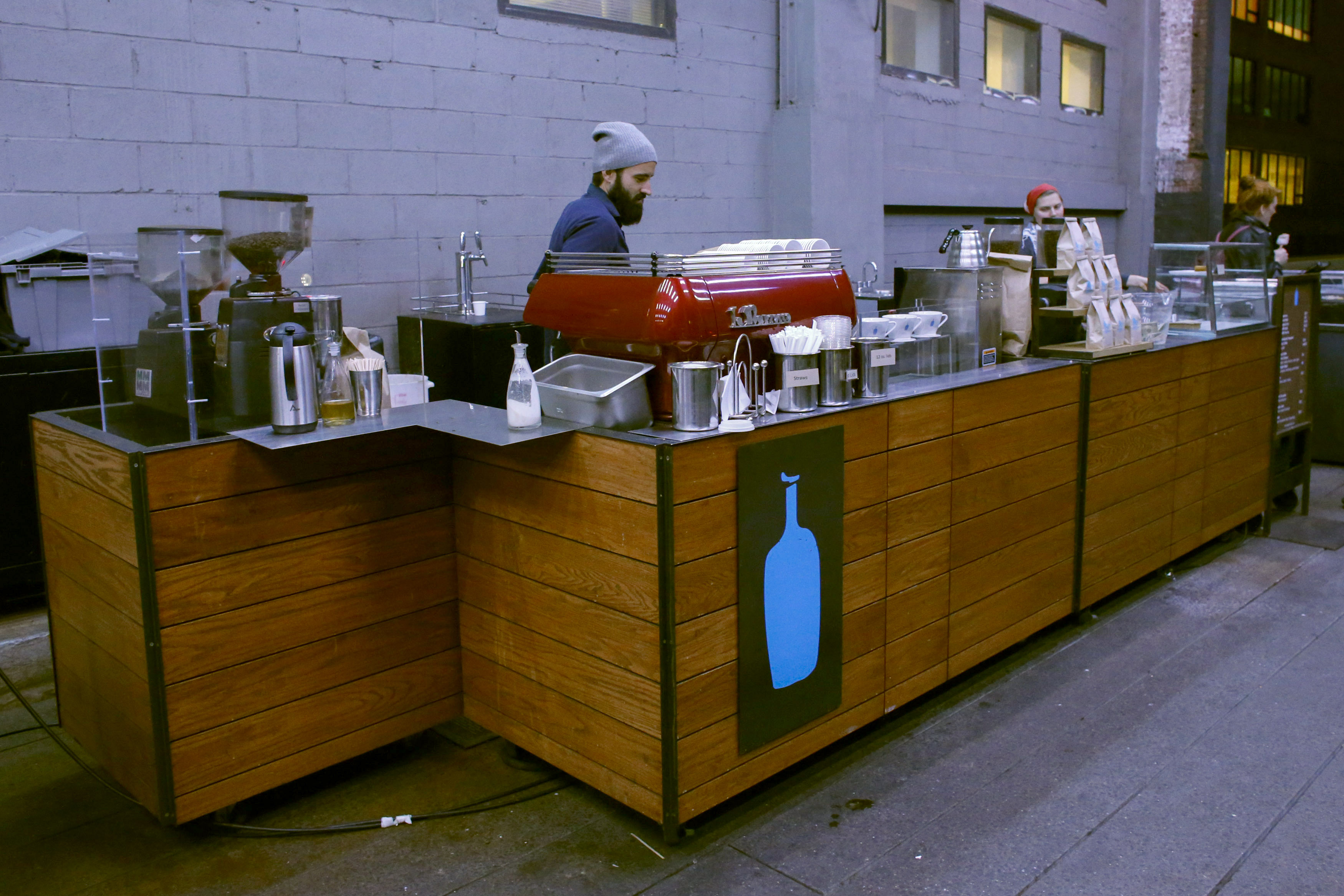
Image via Kena Betancur
Jascha Kaykas-Wolff: Yeah. I think there’s like, could have been designed in Portland and happens to be a coffee shop that started in San Francisco.
Jacob Jaber: But I love the options, there are many options, let the people decide. For us, we focus on our own box, we focus on our customers and if people want to give us a try we want to make sure we do the best job we can converting them. If they don’t like it, we’ll keep trying.
Sunil Rajaraman: Kate, is Jacob the best media trained CEO you’ve ever been in an interview with?
Jacob Jaber: I’m not trained.
Sunil Rajaraman: I’m just teasing.
Jascha Kaykas-Wolff: It’s the coffee!
Kate Clark: No, I mean most CEOs in San Francisco are very diplomatic just like that, it’s very common. So I’d say you’re just on par with the rest of them.
Sunil Rajaraman: Whoa, just like the coffee’s on par. [crosstalk 00:19:54].
Jacob Jaber: Is that a negative thing?
Kate Clark:I was going to say though, I think as far as complimenting Philz, I do think the store and the brand feels a lot more accessible than Blue Bottle does, and that’s why I do not like Blue Bottle. I think it is, like you said about the monoculture, and the aesthetic. The aesthetic is just like, venture back to startup but in coffee shop form, it’s so obnoxious in my opinion, so I do think that Philz does feel like it’s targeting more of the average joe, which is good. Coffee shops should be, they’re neighborhood meetings, they shouldn’t be a place where you feel uncomfortable walking in unless you’re wearing like a cool outfit or something.
Sunil Rajaraman: Has anyone tried the cat shit coffee? What’s it called? That stuff from?
Jacob Jaber: Isn’t it monkey shit?
Kate Clark: It’s not cat shit, no it’s not cat shit is it?
Sunil Rajaraman: It is, yeah. It is, we can fact check this. It’s called…
Kate Clark: I know what you’re talking about. Yeah.
Sunil Rajaraman: Like kopi luwak or something like that?
Jacob Jaber: Yeah, it’s basically a process, we don’t need to get into the details, but it’s a process that, it actually is a terrific, when I was in Bali a while back I had it for the first time actually, it was terrific. It was terrific, but it’s, to each his taste.
Kate Clark: Oh I know it’s totally fine.
Sunil Rajaraman: So, hot take from both of you, best restaurant in San Francisco. Favorite, your favorite, not best. Your favorite right now, restaurant in San Francisco.
Jacob Jaber: Kokkari.
Jascha Kaykas-Wolff: Kokkari?
Jacob Jaber: Kokkari’s my go to. Absolutely.
Jascha Kaykas-Wolff: Awesome.
Sunil Rajaraman: This is troubling. Disclosure, also my favorite San Francisco restaurant. Maybe even my favorite in Palo Alto. Owned by the same guy who was my dentist growing up.
Jacob Jaber: Oh yeah, Abbey is my second favorite. Kokkari, on the time during the month when they have the goat stew, best place.
Jascha Kaykas-Wolff: Oh I haven’t had that.
Kate Clark: What kind of food is this place?
Jascha Kaykas-Wolff: Greek.
Jacob Jaber: Greek. Mediterranean, yeah. It’s terrific.
Jascha Kaykas-Wolff: Lovely. Yeah, they do a goat stew, the octopus and the fried cheese, saganaki, fried cheese, it’s fantastic. It’s so good.
Sunil Rajaraman: So yeah I feel like listeners are going to listen to this episode and think that I’m extremely biased, which of course I am, but I feel like I have to throw in a couple of hardball questions in there.
Sunil Rajaraman: Let’s talk about…
Jascha Kaykas-Wolff: We’re not done with that restaurant question. We got one person taking a restaurant.
Kate Clark: Mine.
Sunil Rajaraman: I totally interrupted. Because I had a thought pop in my mind.
Jascha Kaykas-Wolff: That’s because you’ve had too much coffee.
Sunil Rajaraman: I have had too much coffee. I apologize Kate.
Kate Clark: Well I haven’t gone to a ton of restaurants so I feel like this isn’t fair to me since I just moved here but I really like RT Rotisserie. Do you guys know that one?
Jascha Kaykas-Wolff: I don’t.
Kate Clark: I also don’t go to expensive restaurants, because, you know, journalist salary.
Jacob Jaber: Where is, what is RT rotisserie?
Kate Clark: There’s this, I’m going to butcher this, but there’s like I think a Michelin star restaurant chef guy who has a really fancy restaurant, and this is like a spinout, it’s like rotisserie chickens and chicken sandwiches, and it’s amazing.
Jacob Jaber: Like, can we walk from here?
Kate Clark: It’s in Hayes Valley.
Jacob Jaber: Oh, that’s not really walking.
Jascha Kaykas-Wolff: We can take the muni. Or, I’m just staring…
Sunil Rajaraman: This is Uber strike day, everybody is laughing because I was that guy. I took an Uber. I had a long way to go. It was $4. It was, the strike wasn’t working.
Jascha Kaykas-Wolff: You’re the guy that crosses the picket line when the teachers are out striking aren’t you?
Sunil Rajaraman: No.
Jascha Kaykas-Wolff: Just checking.
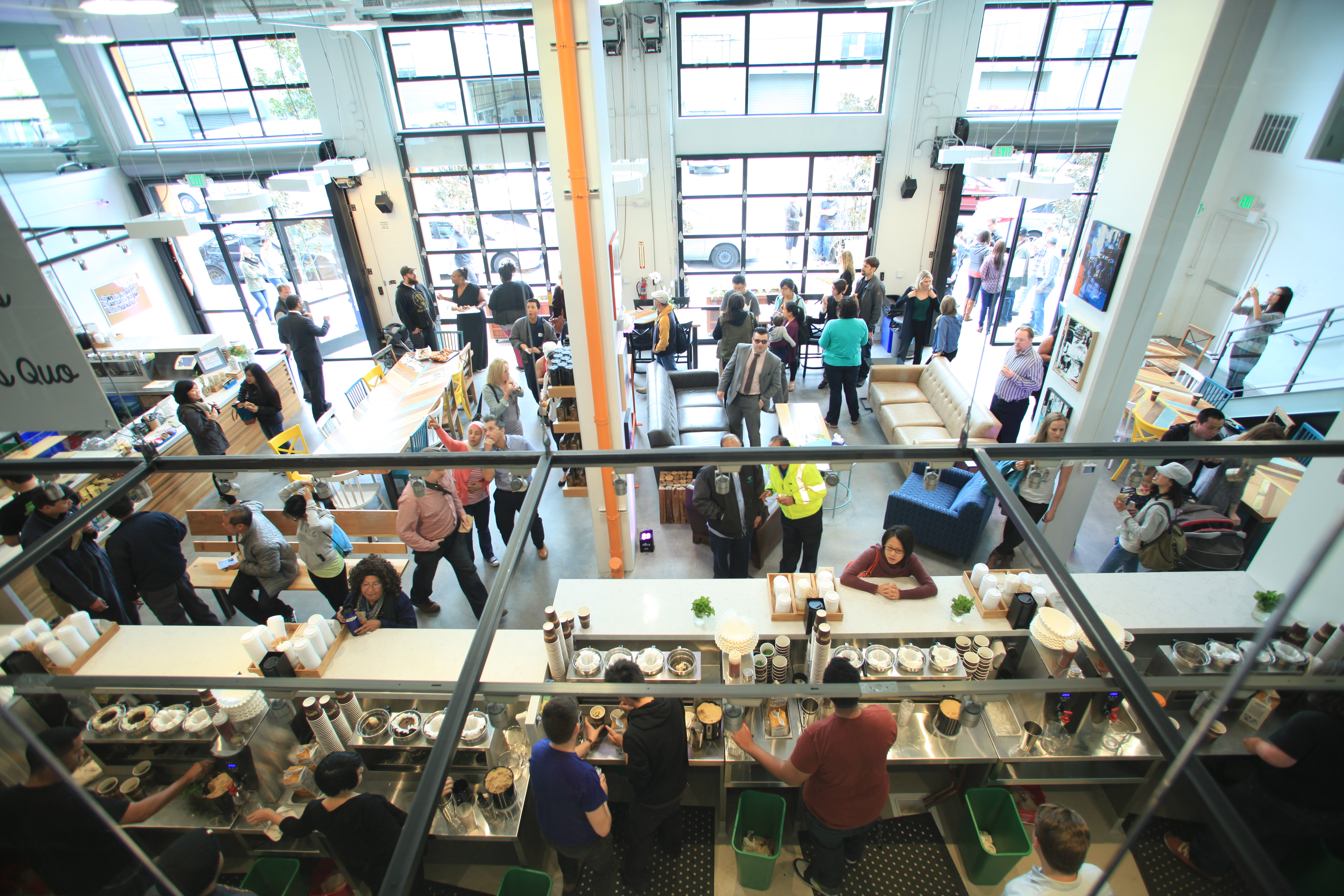
Sunil Rajaraman: The operations of Philz. It kind of feels like a clusterfuck at times. Right, like you walk into the store, this was the original criticism that Kate was levee-ing. And we saw a couple of other people on that thread say they were stressed out when they walk in.
And I had a couple of people that reached out to me just sort of separately saying, yeah it’s like really confusing when you walk there, it’s disorienting, what is your response to folks like that, and do you receive any criticism, or thoughts on the operations piece of it?
Jacob Jaber: Yeah, tying back what I was saying first about how do you enable a personal experience, so the steps of the journey result in having to start with the barista thing, going to pay, going back to pick up, so some of the legacy stores are not designed in a way that’s conducive to a better flow, but if you go to our newer stores, it’s a lot more intuitive.
But it’s really simple, here are the steps. Order with your barista, typically there will be people in line, so you follow the line. Once you order from your barista, head down to the payment register, pay, and then step back. There’s usually a pew where you can sit and wait in front of the baristas, and the person you order from will call it up, to ask you to make sure it’s perfect before you leave.
Sunil Rajaraman: Kate, do you agree that that process is intuitive?
Kate Clark: No, I think hearing you explain it, it sounds a lot simpler than it is. I do think it’s confusing. I understand if you go to Philz a lot, it’s going to feel very second nature, but for me, so I think I’ve been to Philz twice before today, and I know both times I walked to the wrong spot and I said, can I have a latte. And they said no. And I was like, why don’t you have that? Which I want to know why don’t you serve espresso drinks of any kind?
Jacob Jaber: Every, it’s back to the philosophy that the best cup of coffee is the one that’s made to your taste, so we believe that the process that we have allows us for the best customization, but it’s also a process that takes some space and you need multiple baristas, so we wanted to focus on being really, really good at that, versus having a multitude of different options, but we’re also getting a lot, most of our customers convert from latte drinkers to Philz drinkers, so we’re getting a lot of conversion.
But anything new and different is new and different so people who’ve come for the first time, the feedback that I get is if they are confused, they self-correct. Right, and usually the barista will walk you through and guide you, but if not, you learn it and then the next time you come in you self correct and if you, hopefully, don’t make the same mistake.
Jascha Kaykas-Wolff: Kate and I were talking about this in the store, I’m super introverted like when I go into a location where there’s a bunch of people that I don’t know I’m like (noise) I get pangs of anxiety. And I don’t know that, Kate, I would put you in the same bucket as me, but as we were talking about Philz, it’s overwhelming when you come in because it’s very busy. Hot take, another business idea, because everybody loved the faraday cage idea. Do like a separate line for introverts. Or maybe you pick up a little card you just slide up to the barista so they know like, just help me guide through.
Jacob Jaber: We have a mobile app. You don’t even need to talk to anybody, you can just go on your mobile phone, order, pay, and then you walk in it will be sitting there at the pickup station, and you don’t need to talk to anybody. So that’s the alternative.
Jascha Kaykas-Wolff: But the app doesn’t walk you through the four and a half million different types of options.
Jacob Jaber: Well hopefully this podcast helps so, download the app and we’ll give you some recommendations. But I mean people learn it, again anything new is a little bit different but, we’re, we have lines, we have people who love the product and experience. We try to take feedback and improve where we can but we try to do it in a way that doesn’t mess with what we think is really important in the experience.
Sunil Rajaraman: Do both of you see yourselves in San Francisco for the rest of your lives?
Kate Clark: No.
Sunil Rajaraman: Okay, where will you be?
Kate Clark: I don’t know where I’ll be the rest of my life, but I think maybe a few more years here. I wouldn’t want to stay forever. I mean I’m interested what you think growing up here, but I would like to move to New York, and then after that somewhere I can afford to live like, somewhat normally.
Jacob Jaber: Yeah, hopefully, I don’t need to decide just one place. I love San Francisco, I always envision myself having a place here, but I also love Los Angeles, I love the city, and I haven’t, there are more places to see, but I’d also like to have a place internationally too. I don’t know where, when, but at some point, if I’m lucky I’ll get to that point. But I love San Francisco so I always see myself having a hub here.
Sunil Rajaraman: Are you optimistic or pessimistic about the future of the city, given the current state?

Jacob Jaber: Well, I think it’s hard to be optimistic, but I am optimistic, because I think over time people come together and figure it out. I don’t know that the government is going to solve the problem, I think it’s going to take individuals, organizations, to help solve the problem.
Sunil Rajaraman: Tell me what the biggest problem the government has posed to Philz so far to date. Has there been anything San Francisco has done, or imposed, or, really any city for that matter?
Jacob Jaber: No anomalies. I would say there’s no anomalies, or nothing out of the ordinary. No. I don’t think so. There’s nothing that comes to mind.
Sunil Rajaraman: Kate, how about you? Optimistic about San Francisco, the future of San Francisco?
Kate Clark: Um, I haven’t been here for long that I feel bad making predictions, but I still can. I think, given what’s happened to Seattle, it’s transformed so much because of Amazon, I think San Francisco is definitely at the point of no return. And I’m just now learning about the history of the city and summer of love and all that stuff and it seems like, so little of that remains, so I would say no, not optimistic.
Jacob Jaber: Yeah, affordability is the biggest for folks, even folks that work at our workforce, it’s, even if you’re making $20, $25 an hour, sometimes I wonder, it’s like, how do you find a place here and be comfortable. I have empathy for that and I don’t know how to solve that problem so I do think there’s some work that has to be done to enable a good quality of life for the working class people who are doing so many great things in the city.
Jascha Kaykas-Wolff: Did your mayoral candidate that you voted for, win, in the last election?
Jacob Jaber: No. God rest his soul, Ed Lee was a good friend of my dad and I’s and a great customer, but we’ll just see how the issues get handled. So far, again it’s hard to be optimistic, but I think over time, usually things have to get worse before they get better, but I think, I’m hopeful.
Jascha Kaykas-Wolff: Can typical, I guess middle class, or however it’s designed in San Francisco, afford Philz coffee?
Jacob Jaber: Yeah, I can’t speak for anybody’s finances, but a bridge toll is $6, and a cup of Philz is $4 or $5, so it depends. The way I see it is it’s a daily luxury.
Jascha Kaykas-Wolff: What bridge is $6 by the way? I think they’re all like $12.
Jacob Jaber: Golden Gate is how much?
Jascha Kaykas-Wolff: $8? $9? $10?
Sunil Rajaraman: I’m giving you a range but it’s gone up, it’s definitely gone up.
Kate Clark: And what even is middle class in San Francisco?
Jacob Jaber: Yeah, is there one anymore?
Kate Clark: I have no idea what it is.
Jascha Kaykas-Wolff: Isn’t low income considered like $117,000? There’s an article I saw, if you make $117,000–.
Kate Clark: Okay well I’m definitely low income then.
Sunil Rajaraman: Yeah the IPOs let’s see, it’s all the rage, is it going to make things, it’s probably going to make things a lot worse huh?
Jascha Kaykas-Wolff: I would expect it to make things worse.
Sunil Rajaraman: Do you have shares in any of these companies that I’m not aware of? Disclose!
Jascha Kaykas-Wolff: I have no shares in the companies that are IPO’ing or just have IPO’d. Over the course of the last couple of weeks.
Kate Clark: Nice.
Jascha Kaykas-Wolff: There’s been like a bevy of them. At this particular point of time in the recording we’re actually getting close to the end of this episode, so we’re going to tease the question that we’re actually going to ask before Sunil digs into a couple more questions, but I want to make sure you’re thinking about the recommendations for follows on social networks for listeners.
Sunil Rajaraman: So, Kate, do you retract the tweet that you put out there that is the origin of this podcast?
Kate Clark: So, do I now hate Starbucks more than I hate Philz?
Sunil Rajaraman: That’s the question, we’ll start there.
Kate Clark: I’m not ready to say that yet. I need some time to think about it. I think though the coffee was great, I liked the coffee a lot that I had today. Even the mojito one, which was kind of wild. But I can’t say that I, I still feel that love for Starbucks, just for my home town.
Sunil Rajaraman: But even with their ex CEO and ex-chairperson out being a crazy person?
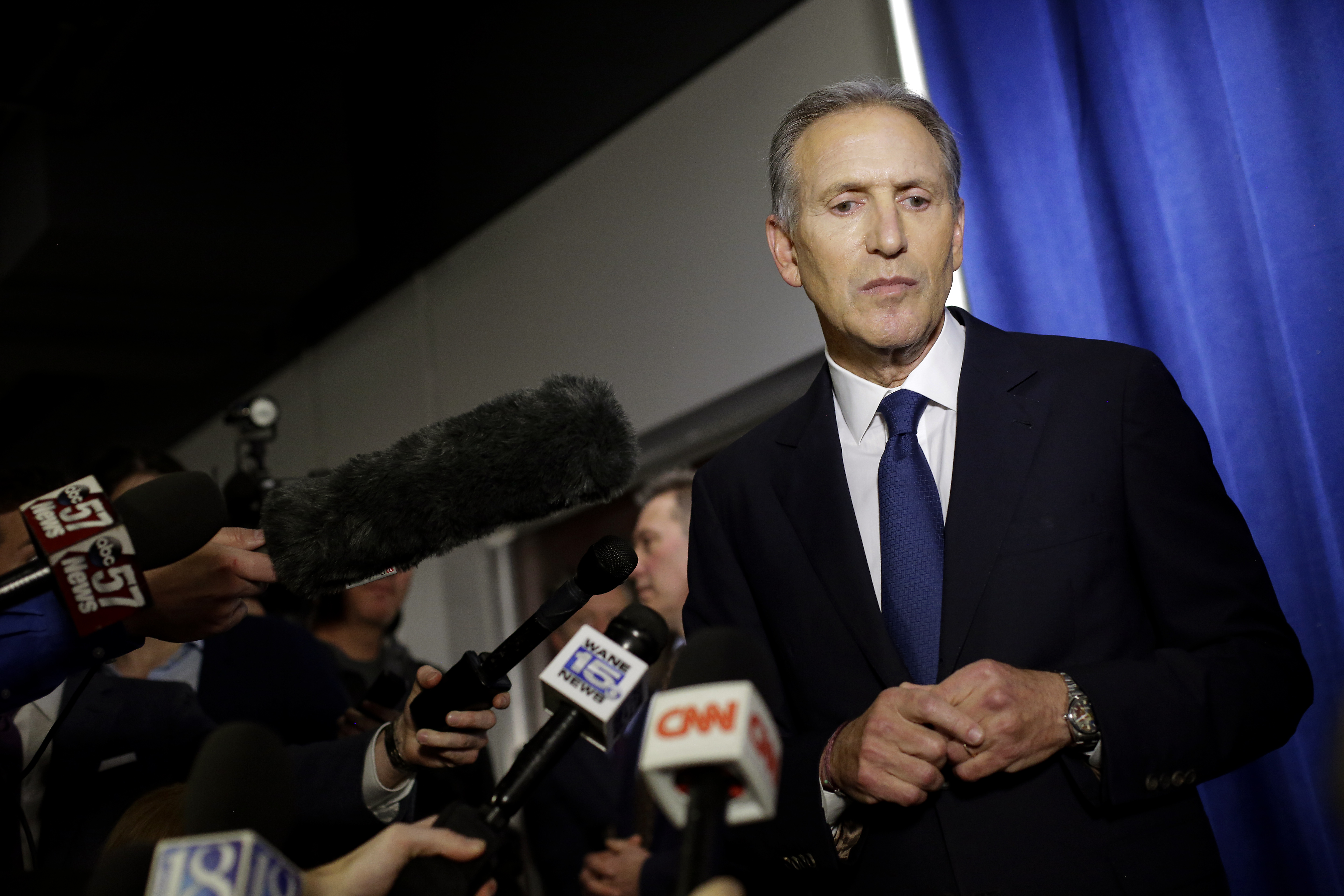
Photo by Joshua Lott/Getty Images
Kate Clark: Right, yeah. Howard Shultz should not be running for president, stop doing that if you’re listening to this. Yeah I mean it’s more like, it’s less about the people behind it and more like, when I see a Starbucks, wherever I am in the world, this is so sappy, but I feel like it’s like somewhere I can go and I feel at home. I think I’ll probably always feel that way, just given that there’s ten billion Starbucks in Seattle on every corner.
Sunil Rajaraman: Let’s do a little conjoint analysis. Do you prefer Philz over Blue Bottle?
Kate Clark: Yes. Definitely.
Sunil Rajaraman: Okay, we got one there. But you know what’s happening here, is you feel escalation of commitment to the stuff you put out on social media, so I’m going to chalk this up to escalation of commitment. I think that, my theory is that in a public forum, Kate, understandably doesn’t want to admit that the original premise for this entire thing is now debunked.
Jascha Kaykas-Wolff: Sunil is now like the AG Barr of Twitter.
Sunil Rajaraman: Yeah, maybe a better comparison please.
Jascha Kaykas-Wolff: Well I’m going to predict that, let’s call it eight weeks from now, when we check in on Twitter, again. The fact that you know Jacob, and you have this experience, and you know the back story, that when we ask you this question again you’re going to say, well actually.
Kate Clark: Yeah, I think that’s highly likely, and I need time to visit Philz, and maybe work at a Philz for awhile, not work behind the counter, but work on my laptop at Philz, and sort of experience it more, and then I can.
Jacob Jaber: Come visit us at our Dogpatch headquarters, we got a great space for working there. I invite you all.
Kate Clark: Great.
Jascha Kaykas-Wolff: We appreciate that.
Sunil Rajaraman: So Jacob, favorite person, people, organization to follow on social media, and why?
Jacob Jaber: I love NuVal’s tweets. Big fan of NuVal. I love his tweets. I like Shane Parrish’s tweets, he runs Farnam Street. I like Philz’s tweets.
Jascha Kaykas-Wolff: Do you write those?
Jacob Jaber: No. We have a team. No. My own tweets yeah, but not the Philz account. There’s so many, but I’m a big fan of NuVal.
Jascha Kaykas-Wolff: You went straight to Twitter, any other places that you’re spending energy or time?
Jacob Jaber: Instagram lately. Instagram. I found it a very powerful way to actually connect with our team members and our different stores. Each one has their own individual account, and our customers. Both to get feedback, to share content, we’re opening in Chicago so talking a lot about that. So I’m still learning, and I just started using it a little bit more, but Instagram is probably 75% of my social media use.
Jascha Kaykas-Wolff: Wow. Are you a shareholder in Facebook also? Just kidding.
Sunil Rajaraman: Kate, same question for you.
Kate Clark: Yeah, I basically live on Twitter, but for some reason, my favorite accounts, the first thing that comes to mind is Mike Isaac which I know you guys had him on the show.
Jascha Kaykas-Wolff: We love Mike.
Kate Clark: I love his tweets, he’s hilarious. He has a newsletter now too that I think is hilarious. I think, I also follow pretty much only journalists on Twitter, so I think the other one that comes to mind is Kara Swisher, she’s just…
Sunil Rajaraman: We’ve had her on the show too.
Kate Clark: Oh, I haven’t heard that one!
Sunil Rajaraman: Yeah it’s a good one.
Kate Clark: Yeah she’s one of my journalism idols.
Jascha Kaykas-Wolff: Yeah, Sunil wore a really bad choice for a shirt that day, and she ground into him for it.
Sunil Rajaraman: Yeah that was rough.
Kate Clark: She would definitely do that.
Sunil Rajaraman: I’ve been on hers too.
Jascha Kaykas-Wolff: Yeah.
Sunil Rajaraman: How much do you sleep a night?
Jacob Jaber: I sleep really well, I probably sleep around seven hours a night?

Image via Shutterstock / baranq
Jascha Kaykas-Wolff: How many cups of coffee do you have?
Jacob Jaber: Every day? Probably four to five. I start with a tesora with honey and cream, and then I have another one, and then I either have a third one or I get the oatmeal cookie. And then I have a rose, and then if I feel it I’ll have another oatmeal cookie.
Sunil Rajaraman: Okay, Kate, do you sleep? Do you drink coffee? How many?
Kate Clark: I do sleep, and I drink a lot of coffee. I sleep more than that, I sleep maybe eight, like eight hours a night. I’m definitely, sleeping is definitely one of my secret weapons. But I probably drink like three to five cups of coffee a day, but I’ll drink just, black coffee, like the cheapest coffee you can buy at the grocery store. I’m not, I wouldn’t be having those pourovers and things at home.
Jascha Kaykas-Wolff: Sunil’s facial expressions are fantastic right now. Do you have like a half a cup a day?
Sunil Rajaraman: No I have two cups, but both usually before 12: 00. And I won’t drink any after. This is an exception.
Kate Clark: I drink it all day long. Any hour of the day.
Jacob Jaber: Yeah.
Jascha Kaykas-Wolff: And you sleep well?
Kate Clark: Yeah.
Jascha Kaykas-Wolff: I find that coffee before I sleep is great. An espresso at night? And then go to bed 45 minutes later, I’m good.
Sunil Rajaraman: Well, this has been incredible. What an experience to get the CEO of a company to respond to essentially what amounted to a customer service complaint, and do a show about it. So thank you Jacob, and Kate, thank you for also agreeing to do this. It’s like you put it out there and you owned up to it.
Kate Clark: Yeah, thanks for having me.
Jacob Jaber: Thanks for having me.
Sunil Rajaraman: Thank you both.
Jascha Kaykas-Wolff: So, just so everybody can have a picture of this, Sunil’s holding his hand up and it’s shaking. Probably like a half an inch in every direction, just total jittery, and I’m going to let everybody know that, I’m kind of feeling the same way too, like my hearts beating a little bit faster, and that’s not just because I really enjoy my time in the recording closet with Sunil, it’s because we’ve probably collectively drank about six cups of coffee over the last hour and a half.
Sunil Rajaraman: This for sure sets the record for the amount of coffee I’ve had in a single day.
Jascha Kaykas-Wolff: Probably not just the amount of coffee in a single day, but the amount of coffee in a single day past noon.
Sunil Rajaraman: This is really breaking protocol for me, but I’ll say it was definitely worth it.
Jascha Kaykas-Wolff: It was totally worth it. And even if we don’t sleep tonight, we’ve had a great conversation, and it’s, I think a good lesson for all of us to learn. The CEO’s in the bay area, the reporters in the bay area, the people that are setting the tastes and kind of writing the record, are all pretty approachable.
Sunil Rajaraman: Yeah I was, that was my takeaway too. It was really a nice human moment to have this virtual interaction happen and then bring the two people together and have a normal conversation about it.
Jascha Kaykas-Wolff: Yeah we had a discussion a couple of seasons ago with the CEO of Ritual, and I have been a steady buyer of Ritual and I bring the bags home, and I make coffee at home with Ritual. I’ve been a fan of buying from Philz of over the course of the last few years, mostly in store, and I got to tell you, learning more about the backstory there makes me want to be an even bigger fan.
Sunil Rajaraman: Yeah I really enjoyed it. We really hope you enjoyed today’s episode as much as we did. Follow Jascha at kaykas, you can follow me at subes01.
Jascha Kaykas-Wolff: And, like we always ask, if you enjoyed this episode just as much as we liked making it, please go back to the app that you found the podcast on, rate us five stars, and leave us a comment, it actually helps more people find this podcast.
Sunil Rajaraman: Thank you very much.
